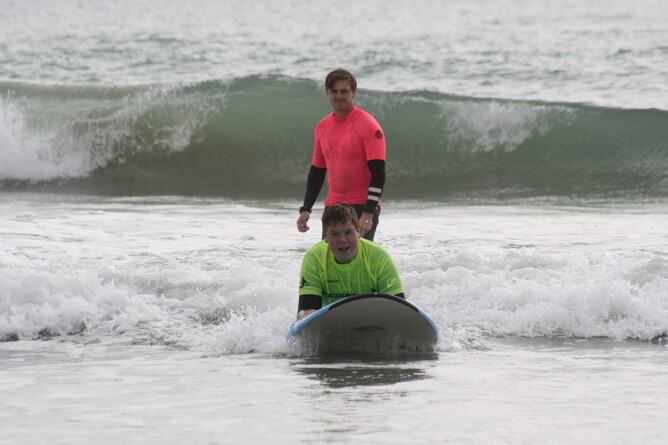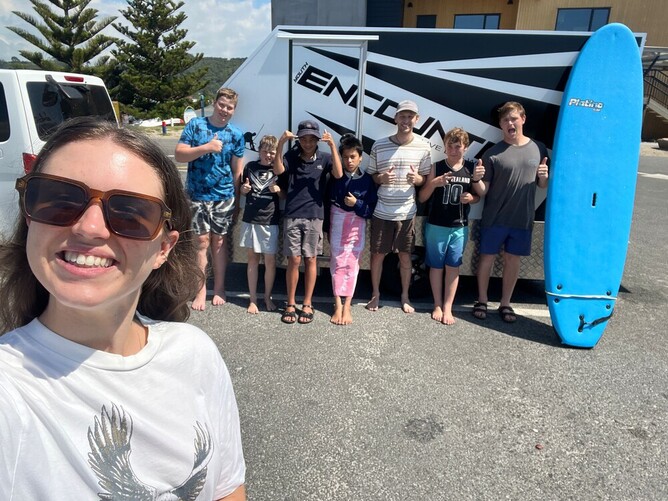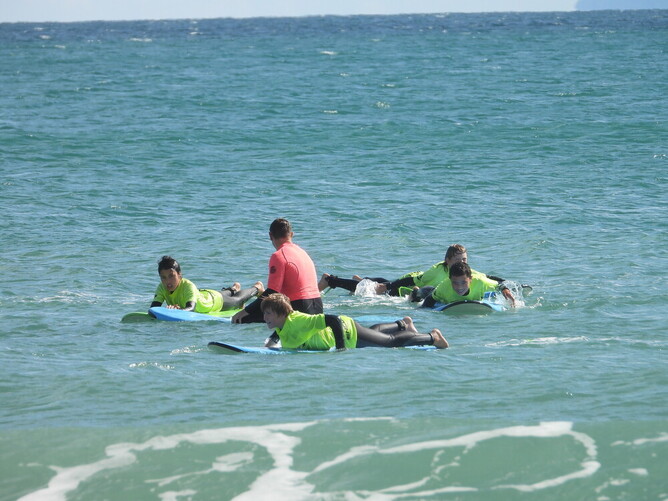In Term 1, 2025, Youth Encounter had the privilege of delivering our Group Therapy programme to six students from Te Puke between the ages of 12 and 15. These rangatahi were referred to us on behalf of Te Puke Kahui Ako. They were identified as having the following risk factors: abuse and neglect, family breakdown, financial hardship, mental health issues, and trauma. During this therapy programme, three youth facilitators – one activity staff and two counsellors – journeyed alongside these young people to ensure their individual needs were met and effective outcomes were reached for each person. Our Kaupapa at Youth Encounter is firmly rooted in Te Whare Tapa Whā model of wellness, which allows facilitators to focus on healing and strengthening a person's holistic well-being while engaged with our programmes. These taiohi were also empowered to make their own decisions and encouraged to challenge their thinking to create new mindsets.
This therapy programme is aimed to provide support for young people who will often not engage in traditional methods of counselling. Whilst incorporating techniques of cognitive behavioural and narrative therapy, the activity of surfing allows young people to learn new skills and unleash their potential. Throughout the eight weeks that this programme was facilitated, the group from Te Puke showed a high level of engagement. We provided each taiohi with support and strategies to improve their mental well-being and social interactions for healthier whānau. Within this programme, our strategic outcome focus is to facilitate young people struggling with mental health, trauma, neurodiversity, and other challenges, to find a more secure identity by:
· Increasing self-worth through strengthening mana
· Having more meaningful relationships with whānau through understanding their whakapapa
· Engaging in values-based learning (mātauranga) for a healthier connection with self
· Developing social skills to grow healthy relationships (hononga)
The impact we saw;
Delivering this programme to such an energetic group of people was an absolute pleasure. They each had incredible participation in this programme and learned some great skills. They gained a greater understanding and awareness of themselves. They learnt a lot about themselves, particularly their own values and how to use them. One of the most significant things that this group took away from their engagement is the module of responsibility. As a group, we set the values of consideration, teachable, honour, responsibility, and fun. We also saw a fantastic shift in their ability to contribute in a group context and share empowering messages.
The outcomes we captured;
Youth Encounter captures the impact on our rangatahi and the difference we have made in their lives for the greater good of society.
We take our rangatahi through Tuckman's group developmental stages as they journey from lacking self-worth to becoming more secure in their identity. From the beginning, safety is established to form trusting connections and unleash their incredible potential. All participants successfully completed eight weeks of Group Therapy and self-reported the following impacts.
1. Increased self-worth and strengthened connection with self (mana);
✔ All participants could identify their core values and use these to create further connections with the self.
✔ All participants learnt the skills and knowledge to feel confident and safe while participating in the dirt bike riding therapy activity.
2. More meaningful relationships with whanau through understanding their whakapapa;
✔ Participants had a trusting and friendly connection with all the Youth Encounter staff.
✔ Participants demonstrated respect for each other and the course facilitators.
✔ Participants' relationships with whānau and friends improved as a direct result of the therapy.
3. Engaged in values-based learning (mātauranga) for a healthier connection with self;
✔ All of the group completed at least 75% of the therapy sessions and celebrated outstanding course completion.
Only a few sessions were missed due to external factors outside of their control.
✔ All the participants demonstrated that they are navigating a more positive track in life.
✔ All participants eagerly engaged in Youth Encounter's Live Life Wide Open Track life learnings of the activity-based therapy.
✔ All participants engaged enthusiastically in values-based learning and adhered to the values set by the group.
4. Developing social skills to grow healthy relationships (hononga);
✔ All participants actively participated in the group and put effort into growing their relationships with their peers and facilitators.
✔ All participants developed trusting and respectful towards Youth Encounter Staff.
The following feedback was received from participants’ during their engagement in the course;
“I had one of the ‘funnest’ days of my life so far and I have the potential to surf some waves.”
“I had fun swimming and trying to surf and the help from the leaders Emily, Logan and Ethan.”
“Youth Encounter has impacted my life by teaching me life lessons like super position mind set.”
“My favourite part was hanging out with all the Youth Encounter and meeting great people.”
“I learnt to always look forward and that I always have a choice to go towards my potential.”
“I will remember all the staff help and support. I learnt to surf better than I was and my favourite thing was meeting Logan and all the other staff and having fun at the beaches that we went to.”
Responsibility
At Youth Encounter, our therapy programme journeys through modules designed to equip young people with essential life skills. This "Responsibility" module helps participants get a better handle on what they're actually responsible for.
A core component of this module explores the concept of personal accountability. We help them understand that they're in charge of themselves – their thoughts, actions, and choices. We use the "remote control" analogy, illustrating that they possess the agency to direct their own lives. Just as a surfer maintains control of their surfboard to navigate the road, participants learn that they are in control of themselves and how they respond to life's journey.
The module emphasises the importance of not relinquishing this control to others. We encourage them not to give other people their remotes (i.e., let other people have control over them) because this is where things can go sideways, and lead them away from their potential, values, and goals. By grounding them in a clear understanding of what they can and can't control, we aim to boost their self-confidence and empower them to take ownership of their actions, fostering improved self-management and decision-making skills.
Story of Transformation;
Nikau, a bright and enthusiastic rangatahi, was brimming with excitement when he was registered Youth Encounter's surf therapy programme. He became the hero of his own story, full of untapped potential. Upon our first engagement with Nikau, it was evident that he was keen to learn some new skills. He was a very active member of the group and showed great encouragement towards his peers.
Despite Nikau’s bubbly outward character, it became clear that he was battling an internal force: the fear of failure. This fear manifested as a reluctance to try, a resistance to the unknown, and a deep-seated worry about not being good enough. The unfamiliarity of the ocean, the potential for falling, and the vulnerability of learning something new loomed large, preventing him from even dipping his toes in the water. The group therapy facilitators became Nikau's guides. They noticed his initial enthusiasm quickly morph into hesitation at the beach. Instead of pushing him, they offered gentle encouragement, patiently explaining the gear and the process. They shared their own stories of learning and falling, normalising the experience and building a sense of trust. They created a safe and supportive environment where vulnerability was accepted.
The Surf Therapy programme itself is structured in a way that gradually introduces participants to the ocean and surfing whilst they also learn more about themselves and the potential they have. This allowed the concept of surfing to be broken down into smaller, more manageable steps. We always emphasise fun, safety, and participation over immediate mastery. For Nikau specifically, the plan involved consistent encouragement, acknowledging his initial anxieties without judgment, and celebrating small victories like simply putting on the wetsuit or stepping into the shallows.
By the final session, the transformation was evident. The hesitation and avoidance were gone. Nikau eagerly got into his wetsuit, grabbed his board, and headed into the waves with a newfound confidence. His potential to embrace new challenges and step outside his comfort zone had been unleashed. It was clear to us that Nikau’s success in this programme extended far beyond the waves as newfound sense of self-belief and resilience.
Please note that names have been changed to protect privacy.


